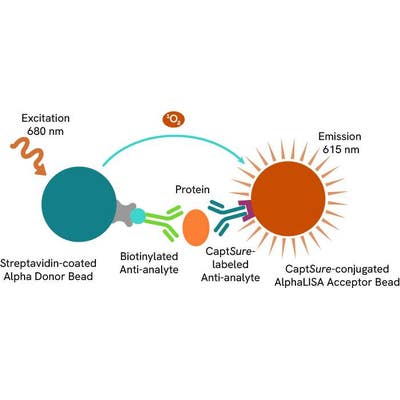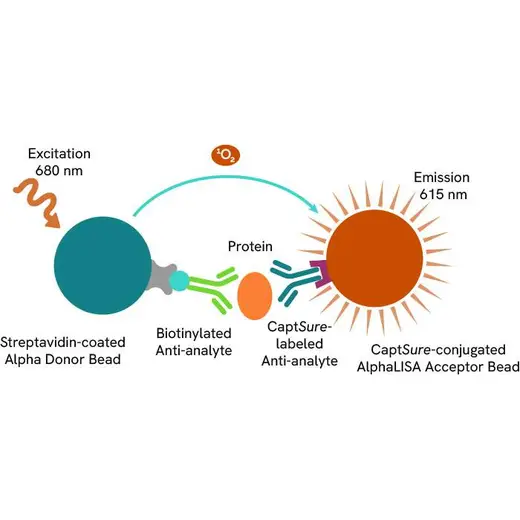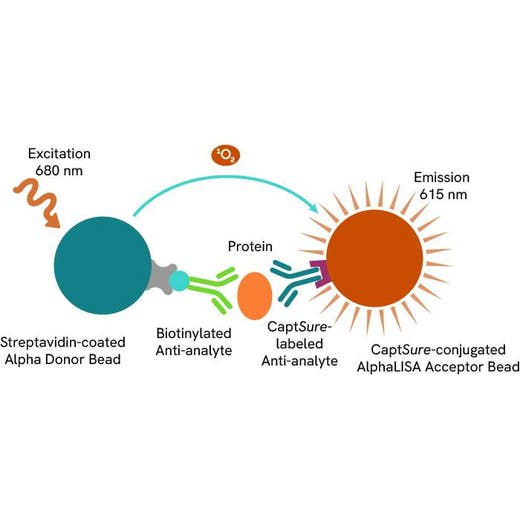
AlphaLISA SureFire Ultra Human Total p300 Detection Kit, 500 Assay Points


AlphaLISA SureFire Ultra Human Total p300 Detection Kit, 500 Assay Points






The AlphaLISA™ SureFire® Ultra™ Human Total p300 assay is a sandwich immunoassay for quantitative detection of total p300 in cellular lysates using Alpha Technology.
For research use only. Not for use in diagnostic procedures. All products to be used in accordance with applicable laws and regulations including without limitation, consumption and disposal requirements under European REACH regulations (EC 1907/2006).
| Feature | Specification |
|---|---|
| Application | Cell Signaling |
| Sample Volume | 10 µL |
The AlphaLISA™ SureFire® Ultra™ Human Total p300 assay is a sandwich immunoassay for quantitative detection of total p300 in cellular lysates using Alpha Technology.
For research use only. Not for use in diagnostic procedures. All products to be used in accordance with applicable laws and regulations including without limitation, consumption and disposal requirements under European REACH regulations (EC 1907/2006).



AlphaLISA SureFire Ultra Human Total p300 Detection Kit, 500 Assay Points



AlphaLISA SureFire Ultra Human Total p300 Detection Kit, 500 Assay Points



Product information
Overview
Histone acetyltransferase p300 is an acetyl transferase encoded by the EP300 gene with numerous aliases: p300, p300 HAT, E1A-associated protein p300 (where E1A = adenovirus early region 1A), and EP300. p300 mediates histone 3 lysine 27 acetylation (H3K27ac) at regulatory elements such as enhancers and promoters. p300 is over-expressed in cancer cells and drug-resistant cancer cells, it activates oncogene transcription and induces cancer cell proliferation, survival, tumorigenesis, metastasis, immune evasion, and drug-resistance.
The AlphaLISA SureFire Human Total p300 Detection Kit is a sandwich immunoassay for the quantitative detection of total p300 in cellular lysates, using Alpha Technology.
Formats
- The HV (high volume) kit contains reagents to run 100 wells in 96-well format, using a 60 μL reaction volume.
- The 500-point kit contains enough reagents to run 500 wells in 384-well format, using a 20 μL reaction volume.
- The 10,000-point kit contains enough reagents to run 10,000 wells in 384-well format, using a 20 μL reaction volume.
- The 50,000-point kit contains enough reagents to run 50,000 wells in 384-well format, using a 20 μL reaction volume.
AlphaLISA SureFire Ultra kits are compatible with
- Cell and tissue lysates
- Antibody modulators
- Biotherapeutic antibodies
Alpha SureFire kits can be used for
- Cellular kinase assays
- Receptor activation studies
- Screening
Specifications
| Application |
Cell Signaling
|
|---|---|
| Automation Compatible |
Yes
|
| Brand |
AlphaLISA SureFire Ultra
|
| Detection Modality |
Alpha
|
| Lysis Buffer Compatibility |
Lysis Buffer
|
| Molecular Modification |
Total
|
| Product Group |
Kit
|
| Sample Volume |
10 µL
|
| Shipping Conditions |
Shipped in Blue Ice
|
| Target |
p300
|
| Target Class |
Phosphoproteins
|
| Target Species |
Human
|
| Technology |
Alpha
|
| Therapeutic Area |
Oncology
|
| Unit Size |
500 Assay Points
|
Video gallery

AlphaLISA SureFire Ultra Human Total p300 Detection Kit, 500 Assay Points

AlphaLISA SureFire Ultra Human Total p300 Detection Kit, 500 Assay Points

Resources
Are you looking for resources, click on the resource type to explore further.
This guide outlines further possible optimization of cellular and immunoassay parameters to ensure the best possible results are...
Discover Alpha SureFire® Ultra™ assays, the no-wash cellular kinase assays leveraging Revvity's exclusive bead-based technology...


How can we help you?
We are here to answer your questions.






























